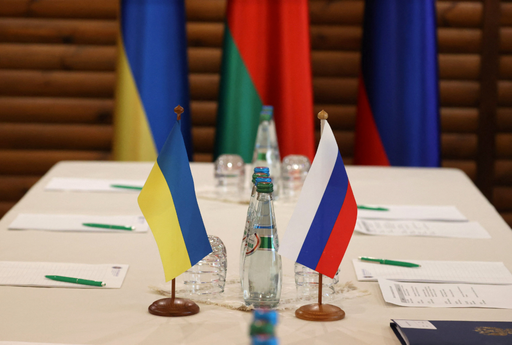All eyes are on Istanbul for Thursday's talks between Russia and Ukraine amid optimism that diplomacy may finally offer a path forward in one of the deadliest wars in Europe in decades.
Much attention has been on who would be in attendance, particularly the prospect of a meeting between the Russian and Ukrainian presidents, and remarks from the US president about a possible detour to Türkiye from his ongoing Gulf trip.
However, analysts say the talks are significant in their own right, expected to tackle a wide array of contentious issues, from ceasefire terms and disputed territories to military neutrality and sanctions.
Oleg Ignatov, senior analyst for Russia at the International Crisis Group, views it as a rare opportunity to end the war.
"It will be very significant, and I think everybody should support these negotiations," he said. "This is the only real chance, the only real option to end this war."

While Zelenskyy is set to meet Erdogan in Ankara, Moscow's delegation lands in Istanbul for planned talks with Ukrainian counterparts.
Russia's position: Security guarantees, neutrality and sanctions relief
While the Istanbul talks could revive the long-stalled peace process first initiated in Türkiye back in March 2022, observers say there is a raft of issues the two sides must navigate if they are to seize this most promising diplomatic opening in years.
Russia, according to Ignatov, will likely press for a comprehensive settlement based on the draft agreement reached in Istanbul in 2022—a document Ukraine later walked away from.
Moscow is expected to demand that Ukraine adopt formal neutrality, enshrined through constitutional changes, and to obtain security guarantees that would prevent NATO expansion into former Soviet states.
"Russia is going to negotiate based on the draft Istanbul agreements from 2022," Ignatov explained. "Ukraine didn't agree with this agreement and withdrew from the negotiations in April 2022."
He noted that the Russian side remains focused on security issues above all else, differing from other actors such as the US.
"If you look at (US presidential envoy) Steve Witkoff's recent interview, he said the main issue is territories. But the Russians ... they say that security is the main issue."
The issue of territories is "very complex and very controversial issue" for both sides, Ignatov added.
A central demand from Moscow is that Ukraine formally renounces any ambitions to join NATO.
"Russia wants on-paper guarantees because, if you look at the Istanbul treaty, it meant for Ukraine to amend its constitution. Right now, Ukraine can pursue NATO membership, according to its constitution, but Russia wants Ukraine to amend it."
Moscow is also expected to seek broader guarantees from NATO and potentially a separate treaty addressing Russia's own security concerns.
Demilitarisation is another major issue, where Russia will likely seek restrictions on the "size of Ukraine's army and guarantees or limitations on what Ukraine can produce or what Ukraine can buy—like which types of weapons, including military technologies", he explained.
Moscow is also likely to raise the issue of language and education laws, calling for more protections for Russian speakers in Ukraine.
Finally, sanctions will be a major focus, even more so after the EU approved its 17th round against Russia on Wednesday.
"If the conflict is over, if there is a comprehensive deal, Russia is saying that sanctions should also be lifted, and there is a discussion on ... how they could be lifted."
Ukraine's position: Ceasefire first, no concessions on sovereignty
From Kiev's perspective, the focus will be on securing an immediate and unconditional ceasefire.
Ukraine is wary of any demands that involve territorial concessions or changes to its constitution, and wants to avoid any agreement that could legitimise Russia's territorial claims, said Ignatov.
"Ukraine is ready to freeze the war," he continued. "It doesn't want to make any commitments about any concessions about its security, about its territories. Ukraine would be satisfied with just freezing the war but not making any commitments to Russia on paper."
Shelby Magid, deputy director of the Eurasia Center at the Atlantic Council, also believes Ukraine's red line is an unconditional ceasefire covering land, air and sea.
"Ukraine stands firm in that they want an unconditional ceasefire for 30 days, and that must be land, air and sea," she said, adding, "I don't expect Russia to agree to that."
Magid also expressed scepticism on whether Russian President Vladimir Putin would meet with Ukraine's Volodymyr Zelenskyy in person.
Ukraine also has humanitarian demands on the table, including "the full return of prisoners of war, of kidnapped children and civilian detainees".
For now, Kiev is focusing on the goal of achieving a temporary ceasefire, rather than hashing out a permanent peace settlement.
"They're looking at the short term to see if a ceasefire can be agreed to for an unconditional 30 days," said Magid, emphasising that any such truce "has to be in the land, air and sea".
"Russia has tried to get versions of ceasefires before that actually favour them because Ukraine is quite strong at sea. Ukraine will not accept a partial ceasefire at this point. That's also not what the US is looking to see."















